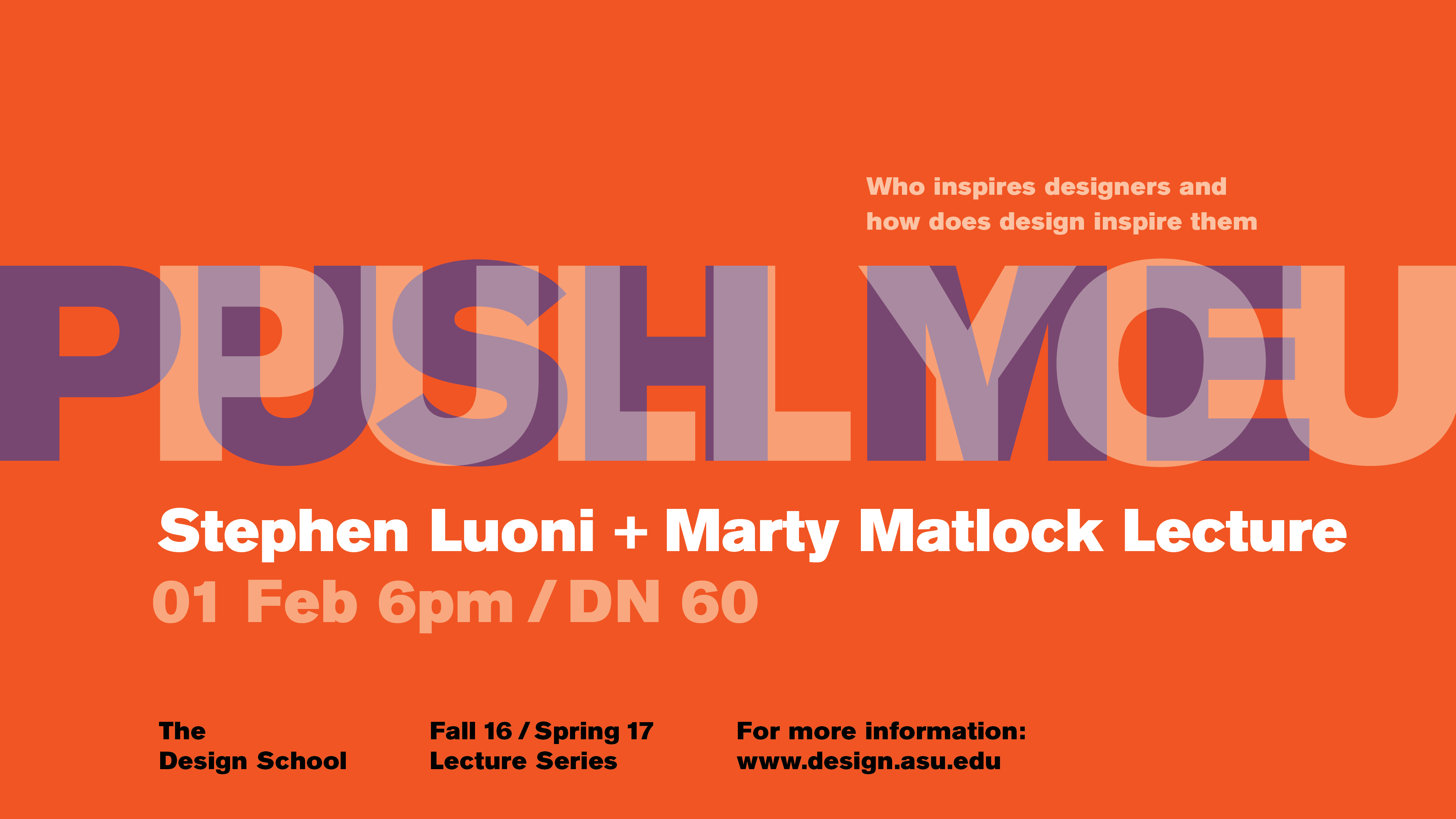Design Discussion featuring Stephen Luoni and Marty Matlock

The Design School Lectures are free and open to the public.
Designing Earth: Ecosystem Services, Human Habitat and Sustainable Prosperity
The way we live together is the product of our biological and social evolution, geography, history and accidents of economy. We did not explicitly design our place on this planet. Rather we have created and mostly tolerated the conditions under which we live through a disconnected process of problem solving to address local, immediate and persistent problems. These parochial solutions become the fabric through which each successive generation builds our homes, towns, cities and regions. The process of ecosystem design provides a more comprehensive way to understand what our communities aspire to be, how we can achieve those aspirations, and how we can construct a framework for prosperity for future generations that is enhanced by our decisions rather than impoverished by them. We can design ecosystem services at the local-to-ecoregion scale, we can design cities for people rather than infrastructure, and we can design human prosperity that sustains Earth’s life support systems. This approach to design is not new, or even particularly complex, but it is hard to do because it forces consideration of common pool resources.
Urban Resilience and Drivers of Change
In an era of unprecedented challenges, design is being asked to solve problems requiring grand strategies as we are sidetracked by incrementalism and a focus on discrete issues. Emphasizing the city as ecology, UACDC has developed a repertoire of public interest models in watershed urbanism, context-sensitive street design, transit-oriented development, neighborhoods for aging, and agricultural urbanism, among others. This problemscape addresses “wicked” problems of the built environment and design’s role in advancing public goods, especially that of urban resiliency. If it is true that the health of a profession is tied to its status with its public, then public interest design has a fundamental role in defining the future shape of practice and education.
Stephen Luoni
Director, University of Arkansas Community Design Center
Stephen Luoni is Director of the University of Arkansas Community Design Center (UACDC) where he is the Steven L. Anderson Chair in Architecture and Urban Studies and a Distinguished Professor of Architecture. Under his direction since 2003, UACDC’s design and research have won more than 100 awards, including Progressive Architecture Awards, American Institute of Architects Honors Awards for Regional and Urban Design, Charter Awards from the Congress for the New Urbanism, American Society of Landscape Architecture Awards, Environmental Design Research Association Awards, American Architecture Awards, and a Holcim Award, all for urban design, research and education. His work at UACDC specializes in interdisciplinary public works projects combining landscape, urban and architectural design. Luoni directed production of the center’s award-winning book: Low Impact Development: a design manual for urban areas. His work has been published in Oz, Architectural Record, Landscape Architecture, Progressive Architecture, Architect, Places, L’Architecture d’Aujourd’ hui, Progressive Planning, International New Architecture, and Public Art Review. He was appointed a 2012 United States Artists Ford Fellow. Luoni has a BS in Architecture from Ohio State University and a Master of Architecture from Yale University.
http://uacdc.uark.edu/
Marty Matlock
Professor of Ecological Engineering, Executive Director of Sustainability Programs, University of Arkansas
Dr. Marty Matlock is Executive Director of the University of Arkansas Office for Sustainability and Professor of Ecological Engineering in the Biological and Agricultural Engineering Department. He received his Ph.D. in Biosystems Engineering from Oklahoma State University, is a registered professional engineer, a Board Certified Environmental Engineer, and a Certified Ecosystem Designer. The focus of Dr. Matlock’s research is development of technologies and processes to increase the resilience and effectiveness of human-dominated ecosystems. He coordinates academic, research, outreach, and facilities efforts in sustainable systems across the University of Arkansas campus. Dr. Matlock has led numerous agricultural sustainability initiatives, from local to international in scope. He serves on the U.S. Secretary of Agriculture’s Committee for the 21st Century, Chairman of the Cherokee Nation Environmental Protection Commission, the Arkansas-Oklahoma Governor’s Commission for the Illinois River, and as sustainability science advisor for 12 food and agricultural product companies.
sustainability.uark.edu